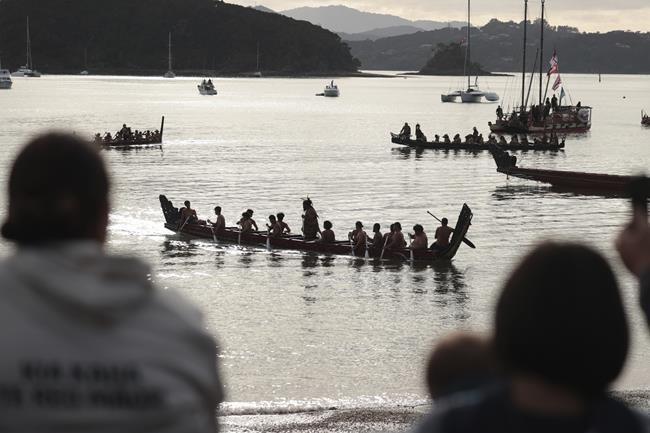
A Waka, a Maori canoe, is paddled at at Waitangi, New Zealand on Thursday, Feb. 6, 2025, as the country begins to mark the anniversary of its founding document, the Treaty of Waitangi. (David White/STUFF via AP)
Republished February 06, 2025 - 4:46 PM
Original Publication Date February 06, 2025 - 3:56 AM
WELLINGTON, New Zealand (AP) — It's often a day marked by spirited politics and at times boisterous protest. But Thursday's anniversary of New Zealand's founding document, the Treaty of Waitangi, passed in muted fashion with Prime Minister Christopher Luxon absent from the main commemorations, amid rancor over an unpopular proposed law redefining the treaty's promises.
On Feb. 6 1840, representatives of the British Crown and 500 Maori tribal leaders signed a treaty at Waitangi, in New Zealand's far north, agreeing to the terms of their relationship.
In modern times, annual events attended by lawmakers and Indigenous leaders at the treaty grounds have allowed the groups to speak face to face, even at times of racial discord.
It has also supplied a litmus test for governments and Maori about the state of the treaty partnership — and sometimes prompts scenes of protest and conciliation. This year, the mood was reflected in a sermon at Waitangi's annual church service Thursday.
“To renegotiate the terms of a marriage usually requires both spouses,” Te Aroha Rountree of the Methodist church said. “It seems our spouse, the Crown, has filed for divorce."
The treaty debated again
The bitterness centers on a proposed law which has become a flashpoint at a critical moment in the conversation about how New Zealand should honor its pledges to Maori when the country was colonized.
The Treaty of Waitangi was drafted in two versions -– one in English and the other in Maori. But the documents dramatically differed — the Maori version promised Indigenous sovereignty — and the Crown soon began to breach both.
It resulted in the near loss of the Indigenous language and deprivation for Maori on almost every metric.
Over the past five decades, tribes have painstakingly clawed back the treaty's promises — which are constructed through legal judgements and billion-dollar settlements with government that return stolen land and other resources to their original owners.
A minor libertarian political party helped Luxon's government to power in 2023 on a platform of redefining the way the treaty's principles are understood by rigidly interpreting them in law to ensure Maori are not unduly favored. Detractors say the bill would dramatically reverse Maori rights in a country that has in recent years started to embrace them.
A controversial lawmaker silenced
The bill's architect, David Seymour, met with protests at Waitangi marae — a Maori meeting house — during speeches by political leaders on Wednesday, as he made a fresh pitch for the law. The measures are widely derided and prompted tens of thousands of people to march on Parliament in Wellington last November.
As Seymour — who is Maori — spoke, women stood as one and silently turned their backs to him. Lengthy portions of his speech were rendered inaudible as demonstrators twice approached him and quietly removed both his microphone and its stand.
A call to confront tensions
Those scenes perhaps explained why Luxon, the prime minister, spent the day far from Waitangi, attending commemorations on the South Island at Onuku Marae, where southern chiefs signed the Treaty months after tribes in the north.
There, he was optimistic about a path through the current animus. Seymour's treaty bill is not expected to pass and Luxon opposes it — although he agreed to usher it through a first vote as part of the deal with Seymour's party that made him prime minister.
“Looking ahead, the ability to resolve differences and build bridges will be at the heart of New Zealand’s success,” Luxon said. “We’ve demonstrated time and time again that we can confront tension, heal past grievances, and move forward, something many other countries around the world have failed to achieve.”
In response, Justin Tipa — chair of Ngai Tahu, the hosting tribe — told Luxon that the time since his ascent to power had signaled “a dramatic shift in the cultural and political landscape” of New Zealand.
“The machinations of modern party politics threaten to corrupt the dignity of our nation's complex and contingent history, our identity,” he added.
At Waitangi, other Maori leaders and some of his political opponents accused Luxon of hiding. But the prime minister insisted that he always intended to spend each Waitangi Day in a different spot — and that he was not the first leader to do so.
A tradition of protest
Most occasions when leaders have stayed away from Waitangi have punctuated tense moments in the Crown-Maori relationship. Some, like Seymour, have traveled there anyway — and faced vehement grievances about treaty breaches.
From Maori wearing black armbands in mourning for stolen land, to a protester throwing a wet t-shirt at Queen Elizabeth II in 1990, Waitangi has often reflected rifts in race relations.
Protests have at times been unconventional. In a famous 2016 episode, a cabinet minister was struck in the face with a sex toy lobbed by a demonstrator — who was arrested but released without charge.
News from © The Associated Press, 2025